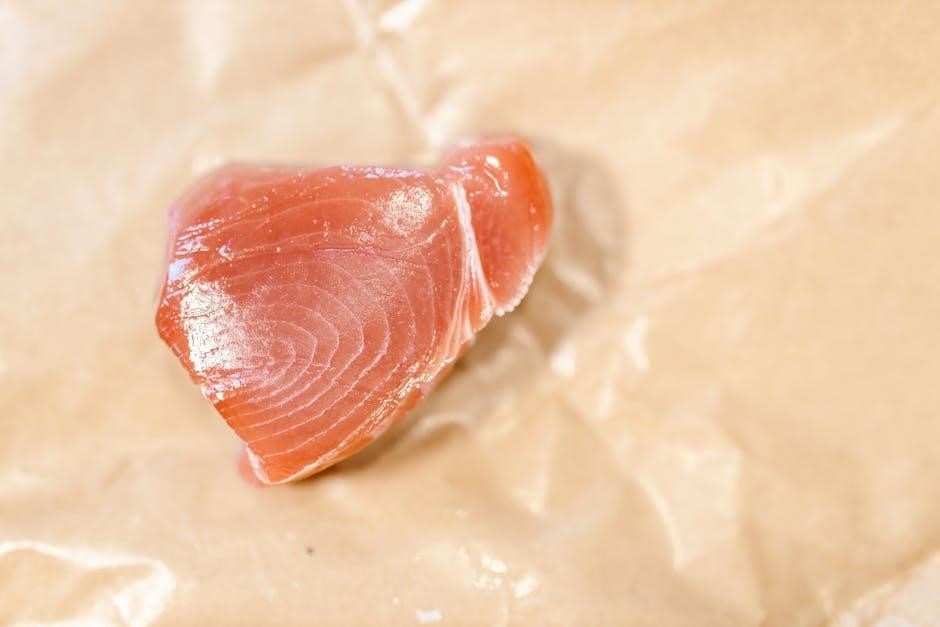
The Primal Diet focuses on whole, unprocessed foods, excluding grains and processed items, emphasizing natural, nutrient-rich choices that align with ancestral eating patterns while adapting to modern tastes.
Overview of the Primal Diet Philosophy
The Primal Diet philosophy revolves around mimicking the eating habits of our ancestors, focusing on whole, unprocessed foods that align with evolutionary biology. It eliminates grains, legumes, and processed items, emphasizing high-quality meats, fish, fruits, vegetables, and healthy fats. The diet prioritizes natural, nutrient-dense foods that promote optimal health and energy. By avoiding modern agricultural and industrial products, it aims to restore a balance with our genetic makeup. This approach is not just about food but also incorporates lifestyle elements like physical activity and stress management, creating a holistic path to wellness that aligns with how humans were designed to thrive.
Key Differences from the Paleo Diet
While both the Primal and Paleo diets avoid grains and processed foods, the Primal Diet is more flexible, particularly regarding dairy. It allows raw and fermented dairy products, unlike Paleo, which strictly excludes them. The Primal Diet also incorporates a more nuanced approach to carbohydrates, guided by the Carbohydrate Curve, which adjusts carb intake based on activity levels. Additionally, Primal emphasizes lifestyle factors like sleep and stress management more holistically. These distinctions make the Primal Diet a more adaptable and less restrictive option compared to the Paleo Diet, while still focusing on whole, nutrient-dense foods.
Benefits of the Primal Diet
The Primal Diet offers numerous health benefits, including weight loss, improved blood sugar control, and enhanced energy levels. By eliminating processed foods and focusing on whole, nutrient-dense options, it supports overall metabolic health. The diet’s emphasis on healthy fats and proteins can reduce inflammation and improve heart health. Additionally, the Primal Diet encourages a holistic lifestyle approach, emphasizing the importance of quality sleep, stress management, and regular physical activity. These combined benefits can lead to better long-term health outcomes and increased vitality, making it a sustainable choice for those seeking a balanced, ancestral eating pattern.

Foods to Eat on the Primal Diet
The Primal Diet focuses on whole, unprocessed foods, including meats, fish, fruits, vegetables, nuts, seeds, and raw dairy. These foods are low in carbohydrates and rich in healthy fats and proteins. The diet avoids processed items, grains, and refined oils to promote better health and align with ancestral eating patterns;
Meat and Poultry: Grass-Fed and Wild Options
The Primal Diet emphasizes grass-fed and wild meat and poultry as central components. Grass-fed beef, lamb, and wild game like venison are rich in omega-3 fatty acids and conjugated linoleic acid (CLA), which support immune function and metabolism. Pasture-raised chicken and turkey are preferred over grain-fed options, as they contain fewer inflammatory compounds. Wild-caught meats, such as bison and elk, offer higher nutrient density and fewer pesticides or antibiotics. Avoiding conventionally raised meats, which may contain hormones and antibiotics, aligns with the diet’s focus on natural, unprocessed foods, ensuring a healthier and more ancestral eating pattern;
Fish and Seafood: Wild-Caught Choices
The Primal Diet highly recommends wild-caught fish and seafood for their high nutritional value. Wild-caught options like salmon, trout, and mackerel are rich in omega-3 fatty acids, essential for heart health and brain function. Shellfish, such as shrimp, scallops, and oysters, provide vital minerals like zinc and iron. Avoid farmed fish, as they may contain higher levels of contaminants and lower nutrient profiles. Wild-caught seafood aligns with the diet’s emphasis on natural, unprocessed foods, promoting better health and aligning with ancestral eating patterns. This makes wild-caught fish and seafood a cornerstone of the Primal Diet food list.
Fruits: Emphasis on Low-Sugar and Seasonal Options
The Primal Diet encourages consuming fruits that are low in sugar and eaten in their natural, seasonal state. Berries, such as strawberries, blueberries, and raspberries, are ideal due to their high antioxidant content and lower sugar levels. Fruits like apples, oranges, and kiwis are also recommended, while high-sugar options like bananas, grapes, and tropical fruits should be eaten in moderation. Seasonal fruits are preferred to ensure freshness and reduced sugar content. This approach aligns with the diet’s focus on whole, unprocessed foods, promoting better digestion and nutrient absorption while maintaining a balanced intake of natural sugars.
Vegetables: Focus on Non-Starchy and Leafy Greens
The Primal Diet emphasizes non-starchy and leafy green vegetables, which are rich in nutrients and low in carbohydrates. Broccoli, spinach, kale, asparagus, and Brussels sprouts are excellent choices, providing essential vitamins, minerals, and antioxidants. These vegetables support digestion and overall health without spiking blood sugar levels. Starchy vegetables like potatoes and corn are generally avoided or consumed in moderation. Leafy greens are particularly encouraged for their high nutrient density and low caloric content. Incorporating a variety of colorful vegetables ensures a balanced intake of fiber and phytonutrients, aligning with the diet’s focus on whole, unprocessed foods for optimal wellness.
Raw and Fermented Dairy Products
The Primal Diet permits raw and fermented dairy products, which are rich in nutrients and probiotics. Raw milk, cheese, and yogurt from grass-fed animals are encouraged, as they retain beneficial enzymes and vitamins. Fermented options like kefir and sour cream are also valued for their digestive benefits and immune-boosting properties. These dairy products are considered healthier alternatives to pasteurized versions, as they preserve natural bacteria and fatty acids. Moderation is key, especially for those sensitive to lactose or dairy proteins. Always opt for high-quality, organic sources to maximize nutritional benefits and align with the diet’s emphasis on whole, unprocessed foods.

Nuts and Seeds: Healthy Fats and Moderation
Nuts and seeds are integral to the Primal Diet, offering healthy fats and essential nutrients. Almonds, walnuts, chia seeds, and flaxseeds are popular choices, rich in omega-3s and antioxidants. These foods support heart health and satisfy hunger. However, moderation is crucial due to their high calorie content. The diet recommends avoiding roasted or processed varieties, opting instead for raw or lightly toasted options. Nuts and seeds provide a convenient snack and enhance meal variety, fitting seamlessly into the diet’s focus on whole, unprocessed foods while maintaining a balanced intake of macronutrients for optimal health and energy levels.

Foods to Avoid on the Primal Diet
The Primal Diet excludes grains, legumes, processed foods, refined oils, and high-sugar items, focusing instead on natural, unprocessed foods that align with ancestral dietary patterns for better health.
Grains and Legumes: Why They Are Restricted
Grains and legumes are excluded from the Primal Diet due to their high content of phytotoxins and anti-nutrients, which can interfere with digestion and nutrient absorption. These foods contain lectins, phytates, and other compounds that may cause inflammation and digestive discomfort in some individuals. Additionally, grains are rich in carbohydrates, which can spike blood sugar levels, contradicting the diet’s low-carb focus. Legumes, while nutritious, are also high in fiber and sugars, making them less ideal for a diet aimed at mimicking ancestral eating patterns. By eliminating these foods, the Primal Diet promotes better gut health and metabolic balance.
Processed Foods and Refined Oils
Processed foods and refined oils are strictly avoided on the Primal Diet due to their high content of unhealthy fats, added sugars, and artificial additives. These foods often lack essential nutrients and are linked to chronic health issues such as obesity, inflammation, and heart disease. Refined oils, like vegetable oil, are high in omega-6 fatty acids, which can disrupt the body’s natural balance when consumed in excess. The diet advocates for whole, minimally processed foods to ensure optimal nutrition and health benefits, aligning with its ancestral eating philosophy.
High-Sugar Foods and Artificial Sweeteners
High-sugar foods and artificial sweeteners are strictly avoided on the Primal Diet due to their negative impact on health. Sugary foods like candy, sodas, and dried fruits can lead to insulin resistance, inflammation, and weight gain. Artificial sweeteners, found in processed foods and diet products, are highly processed and do not align with the diet’s emphasis on natural, whole foods. The Primal Diet encourages natural sources of sweetness, such as low-sugar fruits, but in moderation. Eliminating these harmful additives promotes better blood sugar control, reduced cravings, and overall improved health outcomes.

Sample Primal Diet Meal Plan
A typical day includes eggs, avocado, and spinach for breakfast, grilled meats with vegetables for lunch, and fish or beef with greens for dinner, plus nuts or berries as snacks;
Breakfast Ideas: Eggs, Meats, and Vegetables
Start your day with nutrient-dense options like scrambled eggs with spinach, avocado, and tomatoes, or fried eggs over sautéed mushrooms and kale. Add pastured bacon, sausage, or ham for protein. Omelets with vegetables and raw or fermented cheeses are also great. Consider veggie-packed frittatas or a breakfast skillet with ground beef and broccoli. For a lighter option, pair fresh veggies with boiled or fried eggs. Smoothies with spinach, avocado, and berries are a quick choice. Use healthy fats like olive oil or avocado oil for cooking to enhance flavor and nutrition. These meals align with primal principles, focusing on whole, unprocessed ingredients to fuel your day.
Lunch and Dinner: Combining Proteins and Vegetables
Lunch and dinner on the Primal Diet emphasize pairing high-quality proteins with a variety of vegetables. Grilled or roasted meats like grass-fed beef, pasture-raised chicken, or wild-caught fish are staples. Pair these with non-starchy vegetables such as broccoli, Brussels sprouts, or asparagus. Salad bowls with mixed greens, avocado, and olive oil dressing are also popular. For a hearty meal, try stir-fries with lean meats and colorful veggies, cooked in healthy fats like coconut oil or avocado oil. These meals are designed to be nutrient-dense and satisfying, aligning with the Primal Diet’s focus on whole, unprocessed foods.
Snacks: Nuts, Seeds, and Fresh Fruits
Snacks on the Primal Diet are simple and nutrient-rich, focusing on nuts, seeds, and fresh fruits. Almonds, walnuts, and pumpkin seeds are great options, providing healthy fats and protein. Fresh fruits like berries, apples, and citrus are perfect for quick energy. Moderation is key, especially with higher-sugar fruits like bananas or grapes. Raw veggies with avocado or almond butter also make satisfying snacks. These choices keep energy levels steady and support overall health without relying on processed foods.

Lifestyle Recommendations Beyond Diet
The Primal Diet emphasizes aligning lifestyle with diet, focusing on regular exercise, quality sleep, and stress management. Avoiding processed foods and refined oils further enhances overall well-being naturally.
Exercise and Physical Activity Guidelines
The Primal Diet encourages regular physical activity, emphasizing natural movements like walking, running, and strength training. It recommends avoiding chronic cardio and incorporating rest days to promote recovery and balance. The focus is on functional exercises that mimic ancestral activities, such as sprinting or lifting, to enhance overall fitness. Mark Sisson, the founder, suggests blending low-intensity and high-intensity workouts to maintain health and energy levels. Consistency and variety are key to sustaining a healthy, active lifestyle that complements the dietary principles of the Primal approach. This holistic combination supports long-term wellness and vitality.
Importance of Sleep and Stress Management
Sleep and stress management are integral to the Primal lifestyle, complementing the diet’s focus on whole foods. Prioritizing 7-9 hours of quality sleep aids in hormonal balance, recovery, and metabolic health. Chronic stress is mitigated through practices like meditation, yoga, or deep breathing, which align with ancestral rhythms. The Primal Blueprint emphasizes that a balanced lifestyle, including restful sleep and stress reduction, is essential for optimizing health and maintaining weight. These practices, combined with the diet, promote overall well-being and resilience, reflecting the holistic approach of the Primal philosophy.

The Primal Diet offers a sustainable, holistic approach to nutrition, emphasizing whole, natural foods while avoiding processed and high-carb options, promoting long-term health and vitality effectively.
Final Thoughts on the Primal Diet
The Primal Diet provides a clear, sustainable path to better health by focusing on whole, unprocessed foods. By eliminating grains, sugars, and processed items, it encourages a return to natural eating patterns that promote weight loss, improved energy, and reduced inflammation. This diet is flexible, offering options for low-carb, keto, or carnivore approaches, making it adaptable to various lifestyles. Emphasizing quality and nutrient-dense choices, the Primal Diet supports overall well-being and longevity. It’s not just a diet but a lifestyle change that aligns with ancestral habits while fitting modern needs, making it a viable choice for those seeking long-term health benefits.